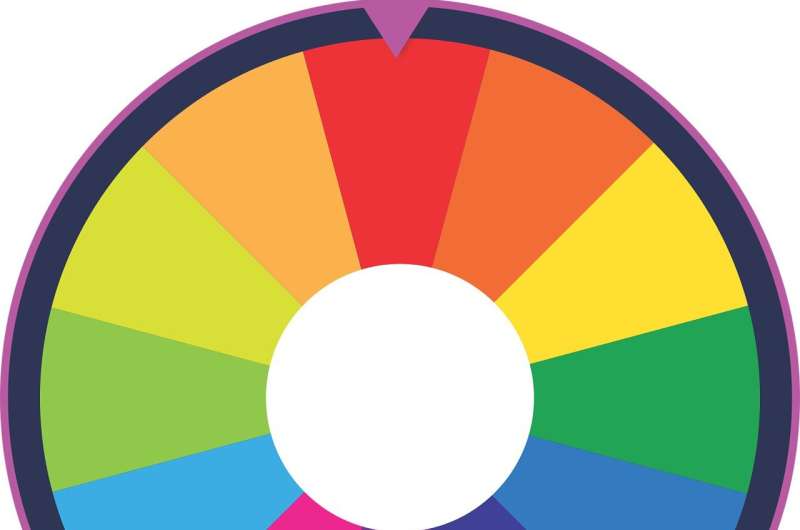This article has been reviewed according to Science X's editorial process and policies. Editors have highlighted the following attributes while ensuring the content's credibility:
fact-checked
peer-reviewed publication
trusted source
proofread
Consumer research shows leaving product promotions to chance has benefits

A local ice cream shop has decided to offer a featured flavor of the week. But instead of just choosing Rocky Road or Black Raspberry, management has elected to spin a wheel with all its flavors on it, and leave the choice to chance.
Sounds like fun, right? Alexander Fulmer thinks so.
Fulmer, assistant professor of marketing at the Cornell Peter and Stephanie Nolan School of Hotel Administration, in the Cornell SC Johnson College of Business, says the practice could heighten promotional punch without increasing promotional budget.
Fulmer is first author of "Promoting a Product Without Increasing the Promotion Budget: How Chance in Promotions can Heighten Consumer Demand," which was published May 27 in the Journal of Consumer Psychology. Fulmer's co-author is Taly Reich, who is an associate professor of marketing at Yale University, and who was Fulmer's doctoral adviser.
"Market research is both time-consuming and very expensive," Fulmer said. "And I thought that maybe injecting a little bit of fun into the promotional process could actually help companies to heighten demand while not having to spend a lot of money."
In a total of 13 experiments, Fulmer found that—for certain types of products—consumers prefer the use of chance in selecting products to promote rather than more traditional, intentional methods. This holds for hedonic products—those aimed at inducing happiness—and not for more utilitarian items.
Fulmer said he began thinking about this concept while working on his doctoral dissertation at Yale.
"A lot of the research that I did then concerns related constructs, like chance and unintentionality," he said. "There's definitely a premium that people put on deliberative thinking and effort, and I was kind of interested in highlighting a few different examples of contexts in which less effort—leaving things to chance or fate—could actually create benefits for consumers and for companies."
He was inspired, in part, by legendary dancer and choreographer Merce Cunningham, who famously used what he called "chance operations"—the music or the order of the steps in a dance piece would be decided right before the performance, by rolling a die or some other chance method.
Fulmer's father Richard, now a clinical psychologist, was a dancer as an undergraduate at Harvard University and studied with Cunningham when the latter visited the school in the early 1960s.
"People would go to Cunningham's performances because there was this spontaneous element of chance injected into them," Fulmer said. "I wanted to see if I could take similar chance processes, like spinning a wheel or rolling a die, and apply them in more of a commercial context."
For this work, Fulmer conducted seven main studies, one field experiment and five supplemental studies to examine the effect of communicating chance selection strategies of products for promotion on consumer preference. All confirmed the hypothesis that consumers prefer hedonic products selected for promotion by chance. Consumers do so because they view a company more favorably—as projecting a fun image—when it leaves promotion of hedonic products to chance.
For example, in study 1, participants were told that a new music streaming service that produces cover songs had selected one of its songs to promote. Promotion was done either by the company selecting the song intentionally, or by a chance process, then participants were given the opportunity to listen to the song.
Nearly half of those who were told the selection was done by "spinning an online wheel" opted to listen to the song, as opposed to just a third of those who viewed the promotion as being more intentional.
The concept of "fun" is a moving target, and different for everyone. In one experiment, again using the streaming service premise, participants were entered into one of three conditions: a control, in which the promotion was determined by the company; a "more fun" chance condition in which colors corresponded to songs; and a "less fun" chance condition in which numbers corresponded to songs.
In the "more fun" condition, 79.4% of participants chose to listen to the song, as opposed to 64.1% in the "less fun" condition and 62.5% in the control.
"Of course, it depends on who you ask," Fulmer said. "If you surveyed a bunch of mathematicians, the results might reverse. Fun means different things to different people."
More information: Alexander Goldklank Fulmer et al, Promoting a product without increasing the promotion budget: How chance in promotions can heighten consumer demand, Journal of Consumer Psychology (2024). DOI: 10.1002/jcpy.1421
Journal information: Journal of Consumer Psychology
Provided by Cornell University



















